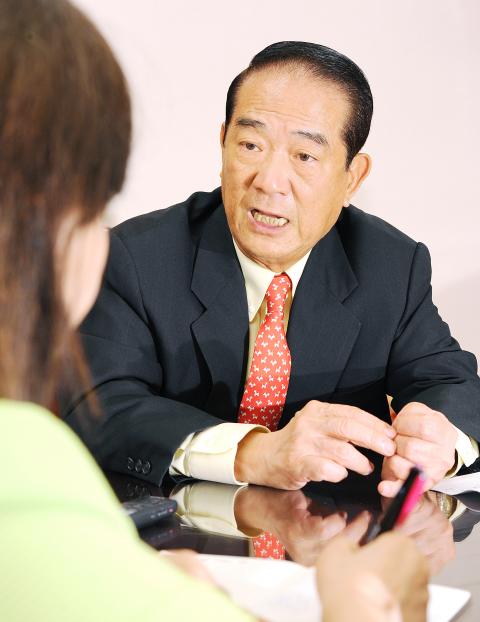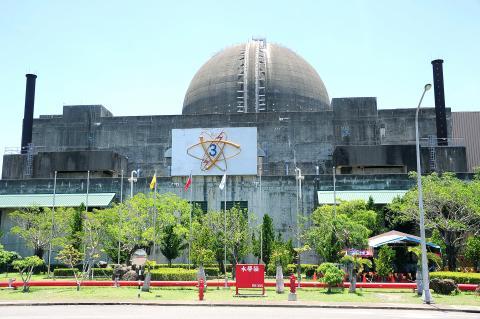Liberty Times: In view of the approaching [combined presidential and legislative] elections, what are your views on the presidential candidates of the two major parties, Ma Ying-jeou (馬英九) of the Chinese Nationalist Party (KMT) and Tsai Ing-wen (蔡英文) of the Democratic Progressive Party (DPP)?
James Soong (宋楚瑜): I would like to make some suggestions to the two candidates. The first suggestion is that I hope they adjust the thought patterns of their election campaigns. The most important issue facing the nation now is how to get Taiwanese to feel their nation has dignity and whether our future is safe.
Although we hope for cross-strait peace and that Taiwan will not be a trouble-maker, the nation cannot abandon its dignity, Taiwan’s core values and its core interests must be safeguarded.

Photo: Fang Pin-chao, Taipei Times
Taiwan faces many challenges, and I hope the two candidates can truly and deeply reflect on the nation’s current situation and the current crises we are facing. The global power dynamics have changed, it is no longer the adversarial standoff of the US-led pro-democracy West and the Soviet-led Eastern bloc. The other side of the Taiwan Strait has changed as well, not only is its economy taking off rapidly, there are also major changes taking place within the mainland domestically.
The population structure of Taiwan has also changed. Not only is it aging, it’s also faced with the issue of a low birth-rate and mothers of many newborn are immigrants.
In the face of these changes, can the methods of resource allocation used in the past, concentrating most resources in key points, still be used? With only 160,000 newborn babies per year and more than 100 vocational schools and colleges in the country, it means a child would have to attend two colleges just to keep them open. What are we to do about these problems? If 12 years of compulsory education is to be accomplished, where is the money to pay for it and what supplementary measures are there?
The finances of our government are the worst they have been in many years; the central government, as well as all levels of local governments, are in debt. The nation’s finances are truly in a dire state and yet when it comes to election season, everyone is making campaign pledges, spending money to get transient votes. That, in the long term, is detrimental to the good of Taiwan.
What is even worse is that people are becoming more and more worried about the functionality of the government.
Do all these issues not merit some serious thought?
In a nutshell, I want to remind the two presidential candidates that the public cares about these issues as they are very relevant to people.
Taiwan does not need a ruler, what Taiwan — a small country facing international competition and the rocket-like rise of China — needs is a staunch leader, and a strong and competent administration.
I would also like to remind the two presidential candidates not to be plagued with the poison of previous propaganda. For example, when I was running in the 2000 presidential election, the KMT said that Soong scatters money wherever he goes. They thought if they mimic Soong — wearing a baseball cap and a white jacket — they would get elected. It doesn’t work like that.
What we need [are people] that get things done, not [the people] who playact. Solving problems is getting things done, but sidestepping issues with a feint is staging a show.
To quote [late Chinese leader] Deng Xiaoping (鄧小平): “No matter a cat’s color, it’s a cat if it can catch mice (黑貓白貓, 能抓耗子的就是好貓).” Color [party affiliation] is not important, whether you’re pan-green or pan-blue, you are a good leader so long as you can solve problems.
My other suggestion is that we need to think of pragmatic long-term solutions for the many problems that we are facing now.
For example, the KMT is proud that the Economic Cooperation Framework Agreement (ECFA) has been passed, while Ms Tsai says she disapproves [of the ECFA.] What I want to suggest is that the ECFA has to be looked at while keeping in mind Taiwan’s interests. Although the nation cannot be forcefully separated from the mainland’s economy and trade, the ECFA should stress that it does not simply benefit a few conglomerates, but also small and medium-sized enterprises, and how it plans to solve cross-strait financial and commercial disputes. The government should also take the initiative to look into where else in the world can be explored, not only [focus] on the mainland.
I wish to remind the two presidential nominees about the unemployment issue. In the past, if a young person worked hard he or she had a chance [to get a job]. Now, many young people are unemployed as soon as they graduate. The most pressing and serious issue for Taiwan is that if brilliant and talented people are all being recruited by the mainland, Singapore and Hong Kong. If Taiwan’s employment situation begins to reflect a low-industrial structure, then it is to the greatest sorrow of Taiwan.
It is our mutual responsibility to make the lives of the next generation better than our own.
LT: What do you think your future role will be?
Soong: The role that the PFP and myself will be playing this time is the role that is crucial, impartial. The party that is brave enough to speak the truth and the one that gets things done.
The primary goal of the PFP is to establish a legislative caucus. According to the current regulations governing the operation of the Legislative Yuan, it means that we need to win three or more legislative seats.
We won’t just nominate people at random; we won’t nominate someone who has no hope [of winning.]
In the future, when the legislative caucus [of the PFP] discusses issues, no policies will be announced that consider only the interest of the individual. We hope to set aside the considerations of personal gain or loss, as well as that of the political party, but to speak for the people.
LT: How about yourself, personally? It has been reported that you have the option of running for a legislative seat, a legislator-at-large position, or for president. Have you decided yet?
Soong: If I run in the election for district legislators, there are three areas in which I could very well score a victory — in Hualien, Linkou and Penghu. However, I have not yet made my final decision.
As to whether I will be listed as a [PFP] legislator-at-large, I have not made up my mind on that either, primarily because of two reasons.
Firstly, the list of legislator-at-large nominees is still under discussion. If I am to be placed at the top, in the middle, or at the bottom [of the list,] or not at all, has not yet been decided. By the way, I would like to take the opportunity here in this interview to call upon anyone who shares the same ideals as us, is professional and is willing to speak up for reason and fairness in the legislature on behalf of the people to contact us [for the possibility of running as a PFP legislator-at-large.]
The third choice is the presidential election. There have been some polls lately showing that some people wish for me to take part, but I have to say with all seriousness now that if I do run in the election, it is not because I wish to pull anyone down. The fact that there are now 10 percent of people wanting me to run in the presidential election shows there are still considerable reservations about the current presidential nominees, and the two political parties’ policies and their performance.
Why are people dissatisfied with the current situation? I hope both political parties will reflect on that.
The true wishes of Taiwanese is not just “who” is in power, but how they govern. If the party in power does not govern competently, then it leads to dissatisfaction among the people.
We should have a good leader who can truly demonstrate in their actions the pride of Taiwanese.
The future is not about who is pursuing power, as I’ve stressed, it is not about holding power, but how you govern. I hope both the KMT and the DPP candidates can propose visions and policies on governance, propose solutions to problems that have substance and, most importantly — like when we apply for a job or to study at a school — show everyone their performance record.
If you ask me what the goals are for taking part in the [January] elections, they are No. 1: to help the PFP win the elections and establish a legislative caucus and No. 2: I have not yet decided whether to join the legislator-at-large or district elections and I personally do not see a bid for presidency as my primary goal.
LT: You will be making a decision before long. Is it fair to say you will not be absent, that you will definitely run in some capacity in the elections?
Soong: I will not be absent from the elections. I must stress, however, that the first priority for the PFP is the establishment of a caucus in the legislature.
Part two of this interview will be published tomorrow.
TRANSLATED BY JAKE CHUANG, STAFF WRITER

A fugitive in a suspected cosmetic surgery fraud case today returned to Taiwan from Canada, after being wanted for six years. Internet celebrity Su Chen-tuan (蘇陳端), known as Lady Nai Nai (貴婦奈奈), and her former boyfriend, plastic surgeon Paul Huang (黃博健), allegedly defrauded clients and friends of about NT$1 billion (US$30.66 million). Su was put on a wanted list in 2019 when she lived in Toronto, Canada, after failing to respond to subpoenas and arrest warrants from the Taipei District Prosecutors’ Office. Su arrived at Taiwan Taoyuan International Airport at 5am today on an EVA Air flight accompanied by a

An essay competition jointly organized by a local writing society and a publisher affiliated with the Chinese Communist Party (CCP) might have contravened the Act Governing Relations Between the People of the Taiwan Area and the Mainland Area (臺灣地區與大陸地區人民關係條例), the Mainland Affairs Council (MAC) said on Thursday. “In this case, the partner organization is clearly an agency under the CCP’s Fujian Provincial Committee,” MAC Deputy Minister and spokesperson Liang Wen-chieh (梁文傑) said at a news briefing in Taipei. “It also involves bringing Taiwanese students to China with all-expenses-paid arrangements to attend award ceremonies and camps,” Liang said. Those two “characteristics” are typically sufficient

A magnitude 5.9 earthquake that struck about 33km off the coast of Hualien City was the "main shock" in a series of quakes in the area, with aftershocks expected over the next three days, the Central Weather Administration (CWA) said yesterday. Prior to the magnitude 5.9 quake shaking most of Taiwan at 6:53pm yesterday, six other earthquakes stronger than a magnitude of 4, starting with a magnitude 5.5 quake at 6:09pm, occurred in the area. CWA Seismological Center Director Wu Chien-fu (吳健富) confirmed that the quakes were all part of the same series and that the magnitude 5.5 temblor was

Restarting the No. 2 reactor at the Ma-anshan Nuclear Power Plant would take up to 18 months, Minister of Economic Affairs J.W. Kuo (郭智輝) said today. Kuo was answering questions during a meeting of the Legislative Yuan’s Economics Committee, where legislators are considering amendments to the Renewable Energy Development Act (再生能源發展條) amid concerns about the consequences of the Pingtung County reactor’s decommissioning scheduled for May 17. Its decommissioning is to mark the end of Taiwan’s nuclear power production. However, Chinese Nationalist Party (KMT) lawmakers have proposed an amendment to the Nuclear Reactor Facilities Regulation Act (核子反應器設施管制法) that would extend the life of existing